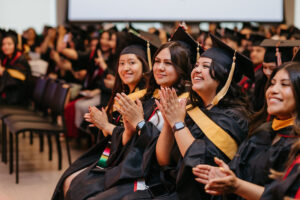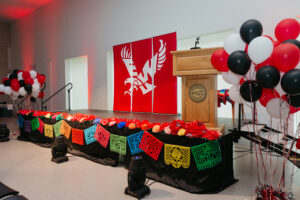Let’s face it. Over the past few years, the Chicano Education Program (CEP) at Eastern Washington University has experienced challenging transitions. Not only was the University facing lean times, but the director also resigned, an interim was named, and the federal funding for the College Assistance Migrant Program (CAMP) was not renewed.
They say when times get tough, it shows who your true friends are. Times were never tougher for institutions of higher education than between 2009-2012. EWU took huge state budget cuts and to make things worse, in spring 2012 we received word our CAMP grant that we had thrived on for 10 years would not be renewed. The CAMP grant made it possible for the Chicano Education program to be a bustling place with lots of staff and events, not just for CAMP students, but also for all Chican(a)o/Latin(a)o students at EWU.
Through transition, comes opportunity! Opportunity to celebrate student success, opportunity to reapply for the CAMP funding once again, and opportunity to bring in new leadership that will poise EWU and the CEP to be the number one provider of higher education and services to Chican(a)o/Latin(a)o students in the State of Washington.
With the growth in the Chican(a)o/Latin(a)o population inside and outside the State of Washington comes opportunity that EWU is fully embracing. According to the U.S. Department of Commerce, 2010 Census Brief, more than half of the growth in the total population of the United States between 2000 and 2010 was due to an increase in the Hispanic population. In the State of Washington, the population of Hispanic/Latino origin grew from 441,509 to 775,790 or approximately 76% during that same time period, and growth continues.
In true support of the CEP and the changing demographics of the region, CSBSSW and the CEP are working together to hire a new Director who is intimately connected to the Chican(a)o/Latin(a)o students and culture of this region. As EWU and the CEP are committed to the creation of an inclusive, supportive community for all its members, this individual will have professional experience and interest in culturally diverse groups, diverse learning styles, social justice and the ability of higher education to contribute to the creation of a just and more inclusive society.
Student success is the number one strategic goal of the university. The CEP has a longstanding tradition of outreach to Central and Eastern Washington’s growing Chican(a)o/Latin(a)o communities and actively recruits and supports Chican(a)o/Latin(a)o students to have successful academic careers. EWU supports Chicano education through funding for recruitment and retention, student employees, and program operation (over $270,000 in state funding for CEP since 2007).
Through the generous support of private donors, many scholarships dedicated to Chican(a)o/Latin(a)o students are available including the Chicano Education Multicultural Achievement Scholarship, the Chicano Education Teacher’s Scholarship, the Otto Guardado Chicano Education Scholarship, the Rueben Trejo Chicano/Latino in Art Scholarship, and the Wittenbach for Chicano Education Scholarship. Students will receive scholarship awards in 2014-15 totaling $22,390.
But student success goes far beyond dollars. Despite the challenges mentioned above, the college, the university, and the faculty, staff, and students in the CEP have remained committed, involved and supportive of the program, the University, and the community. Highlights of CEP student activities include:
The National Cesar E. Chavez Blood Drive Challenge celebrates Cesar E. Chavez’s Legacy as an American civic leader by engaging college students to promote: 1) health education 2) health & science careers, 3) civic engagement and 4) saving lives! CEP student leaders organize a blood donor recruitment campaign on their college campus culminating in a campus-wide health service-learning event. The event was founded in 2009 and over 250 colleges/universities and more than 30,000 students participate nationwide. In 2012, the National Cesar E. Chavez Blood Drive Challenge was honored as Partner of the Year by the blood services industry association, America’s Blood Centers. Almost all blood centers nationwide now participate annually, to include the American Red Cross. In 2014, this blood drive was in honor of our fallen Eagles, previous CEP/CAMP students Nancy Zepeda and Ashley Gonzales.
M.E.Ch.A has been active on and off campus bringing awareness and advocating for Immigration Reform and the Dream Act through educational forums and rallies. In Spring 2013, MEChA organized and mobilized other community groups to participate in a peaceful march in downtown Spokane bringing awareness regarding the inequities and injustices of current immigration policy.
M.E.Ch.A.’s leadership and activism are well recognized on campus. Some active members are currently serving important leadership positions on campus, such as Frank Navarro, ASEWU Executive Vice President. MEChA also received the EWU Soaring Eagles Award for their outstanding service in Spring 2013.
Several EWU/CEP students attended the 2013 Latino Education Achievement Program conference (LEAP) held in Tacoma, Washington. The purpose of this event was to involve adolescent Chican(a)o/Latin(a)o high school students in hopes of inspiring them to pursue higher education.
Omega Delta Phi, a CEP affiliated Latino Greek fraternity at EWU, helped raise funds for their philanthropy, Court Appointed Special Advocates (CASA). CASA volunteers are appointed by judges to watch over and advocate for abused and neglected children, to ensure they are not lost in the overburdened legal and social service system. Volunteers stay with each case until it is closed and the child is placed in a safe, permanent home.
Each year the Chicano Education Program hosts a Welcome Back Reception, welcoming nearly 250 attendees. At this event, student organizations assist in the extended welcome to new and returning students, and CEP Scholarship recipients are recognized.
CEP faculty member Jerry Garcia has moved on to continue his teaching and research and to work more closely with the students in the program. He published his latest book Looking like the Enemy: Japanese Mexicans, the Mexican State and US Hegemony, 1897-1945 in 2013. Additionally, due to his work with the Sea Mar Community Health Centers, the Executive Internship program has provided internship opportunities for CEP students. Sea Mar Community Health Clinics founded in 1978, is a community-based organization committed to providing quality, comprehensive health and human services in Washington state.
Martin Garcia, PhD not only serves as the faculty advisor for M.E.Ch.A., but he also works with many CEP students on research. In fall 2013, Professor Martin Garcia presented on a panel session titled: “Action Research: Community Struggles, Power, and Chicano/a Studies Scholarship” at the 2013 National Association for Chicana & Chicano Scholars Northwest Region Conference at the Evergreen State College in Olympia, WA.
In December 2012, Martin Garcia, along with Joseph Lenti and Bob Dean from the History Department, led a study-abroad trip to Cuba. The faculty and students who participated in the Cuba trip shared their experiences with the Spokane Community through public forums. Students who went on the trip worked with Professors Garcia and Lenti in fall quarter to learn about Cuban society and conduct research on various topics such as women’s rights, organic farming, aging, education and the effects of the US trade embargo on Cuba. The faculty and students have shared their experiences from their Cuba trip on their blog and on KYRS Thin Air Community Radio.
Jennifer Nunez, Coordinator/Recruiter, continues to be as busy as ever. In between fall 2012 and 2013, CEP hosted 13 on-campus visitations from high schools, recruited at 34 different high schools within Washington State, and attended 18 Parent Information Nights and assisted with the filing of FAFSAs. She was also instrumental in securing grants of $75,000 in 2012 and $88,680 in 2013 from the Office of Superintendent of Public Instruction to host the Annual Dare to Dream Academy. This is a one-week academy where students experience college life and are exposed to resources for pursuing higher education. Our students are actively involved in different recruitment activities, encouraging the next generation of Chican(a)o/Latino(a) students to attend college while developing their leadership skills.
Under the leadership of Interim Director Raphael Guillory the 2014 CAMP grant proposal was successfully submitted to the US Department of Education. The proposal follows the established model of the Chicano Education director serving also as the CAMP director, should the grant be secured. Successfully securing this grant will allow us to hire more staff and serve more students, documented and undocumented, in the program. The announcement of awards will be in late spring or early summer of 2014. Committed to the purpose of this program, over the past two years the University and College provided support to existing CAMP students totaling $117,876 while preparing to reapply for the federal grant. EWU continues to be extremely proud of our Chicano Education Program and all of the achievements of our affiliated student organizations and faculty members. We continue to transition and to seize all possible opportunities!



